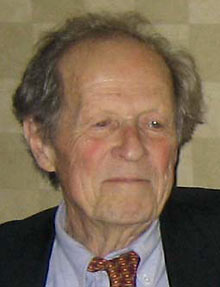UC Berkeley Press Release
Bart McGuire, professor emeritus and noted economist, dies
BERKELEY – Charles Bartlett "Bart" McGuire, an emeritus professor of public policy at the University of California, Berkeley, known for his work on the first mathematical framework to predict travel and route choices in urban transportation systems, died Jan. 23 at age 80 at Kaiser Permanente Medical Center in Richmond, Calif. He had been suffering from cancer.
 Charles Bartlett "Bart" McGuire |
Colleagues described him as a creative, inquisitive and brilliant mathematician and economic theorist who was keenly interested in research with potential practical applications to national defense, the environment, criminal justice and energy. He made wide-reaching contributions in such fields as economic organization, price theory, decision analysis and regulation.
At the RAND Corporation in the 1950s, McGuire was among a group of young defense policy analysts, some of whom later moved to Washington, D.C., as advisors to U.S. Defense Secretary Robert McNamara.
McGuire was honored last November at the annual meeting of the Institute for Operations Research and the Management Sciences on the 50th anniversary of "Studies in the Economics of Transportation." He wrote that monograph with Martin Beckmann, an emeritus professor at Brown University, and the late Christopher Winsten. It is now the basis for large-scale computer models used worldwide for transportation planning.
David Boyce, a professor emeritus at Northwestern University, said the trio's research also is used to explore topics such as decentralized decision-making and the Internet, and games on computer networks.
In 1959, McGuire was visionary as part of an academic vanguard applying algebraic "lattice theory" to the economics of information, a process methodology now fashionable in economics, said Thomas Marschak, a professor at UC Berkeley's Haas School of Business who studied with McGuire at the University of Chicago and was his colleague at RAND before they both came to UC Berkeley.
A native of Minneapolis, Minn., McGuire served as an electronics technician in the U.S. Navy from 1943-1946 and spent part of his tour in Japan.
He earned a bachelor's degree in political science and economics at the University of Minnesota in 1949 and a master's degree in economics at the University of Chicago three years later.
McGuire started working for RAND in 1954. He joined the UC Berkeley School of Business Administration in 1961 at the urging of Marschak and Roy Radner, an economist and statistician he had worked with at the University of Chicago and at RAND before Radner joined UC Berkeley's business school.
McGuire and Radner had developed at RAND a "command and control" computer simulation model to help develop communication policies and rules to minimize the risks of accidental nuclear war, Radner recalled.
The two also published "Some Team Models of a Sales Organization" in Management Science in 1961. They studied bakery delivery driver teams - McGuire's father owned a bakery - and recommended increased communication between drivers to increase efficiency. McGuire and Radner later co-edited "Decision and Organization," published in 1972, an important book in the understanding of the economics of organizations.
In 1968, McGuire received a Guggenheim Fellowship and studied at the London School of Economics for a year.
In 1971, he permanently joined the faculty of the newly-formed Graduate School of Public Policy at UC Berkeley, now the Goldman School of Public Policy. His decision to join the then-fledgling school "said an enormous amount about the academic value of this kind of work," said Lee Friedman, professor at the Goldman School of Public Policy.
Friedman said McGuire was supportive of students, encouraging them to develop effective mathematical models for public policy analysis, risk assessment and cost-benefit analysis.
In 1975, McGuire was a visiting economist at the U.S. Department of the Interior. He helped develop a bidding system for the government to assess what firms should be allowed to prospect for coal on federal lands. It is used by the government today to determine which companies should search for oil on government property, Friedman said.
From 1978-1983, McGuire served as chair of UC Berkeley's Energy and Resources Group.
He retired from the campus in 1992. His most recent research concerned the problem of efficient sorting and could be applied to the design of efficient libraries. McGuire returned to campus from 1993 to1994 as acting director of the UC Energy Institute and published several reports on decentralized power grids.
He was fond of music and poetry and often wrote whimsical haikus. His widow, Sally O'Connell, said that if McGuire had written his own obituary, it "probably would have been compressed into 17 syllables."
McGuire also enjoyed The New York Times Book Review, three-dimensional paper folding, hiking, fishing and relaxing at his cabin in the Sierra Nevada.
He is survived by his widow, Sally; son, Patrick McGuire of El Cerrito; stepchildren Clare Tipple Golec of Arcata, Calif. and Nicole Tipple of Westhaven, Calif.; and brother, Mike McGuire of Stillwater, Minn. His first wife, Catherine, died in 1985.
No memorial services are planned, at McGuire's request.

